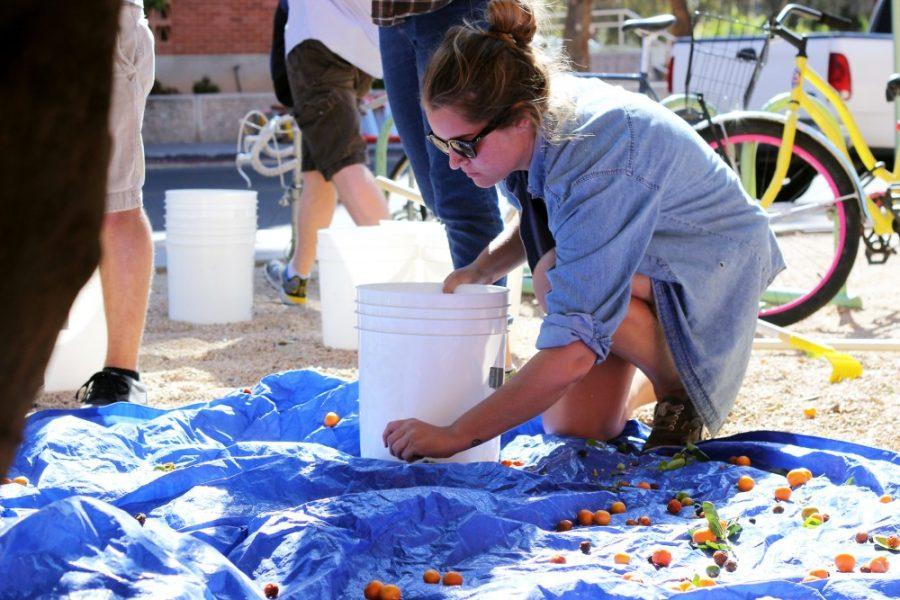The UA chapter of LEAF prepared to harvest the calamondin limes from trees around campus on Saturday.
Linking Edible Arizona Forests is an organization that works with the Iskashitaa Refugee Network to harvest the edible food growing on the UA campus. According to Melanie Lenart, LEAF project manager and adjunct professor in the department of soil, water and environmental science, and Barbara Eiswerth, director of Iskashitaa, said the organizations have several goals including using the harvested fruits to make juice and donating the fruit to refugees still trying to adjust to life in the United States.
Students stood on ladders and used rakes to reach the fruit high up in the trees. They were harvesting calamondin limes, a very tart fruit with a sweet edible skin, a cross between a kumquat and a mandarin orange. The limes fell onto tarps that lined the ground surrounding the trees as workers placed the fallen fruit into buckets.
One of the major goals of the Iskashitaa Refugee Network, which has been at the forefront of local food harvesting in Tucson for 10 years, is to provide refugees with food that would otherwise go unused, Eiswerth said.
“Less fruit is going to landfills and more fruit is going to homeless shelters and refugee families just arriving from all over the world,” Eiswerth said. “Bombarding households with fruit and vegetables that would have otherwise gone to waste makes perfect sense.”
Lenart said it was a no-brainer for the organization to team up with the Iskashitaa Refugee Network. This is the first year that the UA chapter, which is funded by UA Green Fund, has been in existence, and it has decided to focus its efforts on olives and citrus this season. With collaboration from the department of soil, water and environmental science, Campus Arboretum,
Dining Services and Facilities Management, LEAF had a successful olive harvest in November and is planning another citrus harvest in April, Lenart said.
“Once you get started, you realize how many different groups are involved in it,” Lenart said. “It’s just like collaboration at every level.”
Ty Trainer, a senior studying Spanish, Portuguese and global studies, was the key organizer for Saturday’s event. Trainer, who is an intern with both LEAF and the Iskashitaa Refugee Network, has had three years experience working with refugees who, according to Trainer, often have a difficult time finding affordable, healthy food.
“Just showing refugees that they have these food resources available to them, literally in their backyard, just makes a world of difference,” Trainer said.
The refugees, however, are not the only ones who can benefit from these events, which are open to the community. Many UA students are unaware that the fruit growing on campus is edible, so LEAF is hoping to educate more people about this food growing in their environment, Lenart said.
Noel Awad, a UA graduate who participated in the citrus harvest on Saturday, said as a student she didn’t know about the fruit either.
“When I started school here everybody was telling me not to pick [fruit] from the trees, not to eat them,” she said. “They told me the fruit was inedible.”
Lenart is hoping to bring an urban focus to LEAF by bringing the food and the people together in the same place, although they are certainly not limited to urban areas.
“This is a new paradigm that we’re coming into with people really thinking about where their food comes from,” Lenart said.









